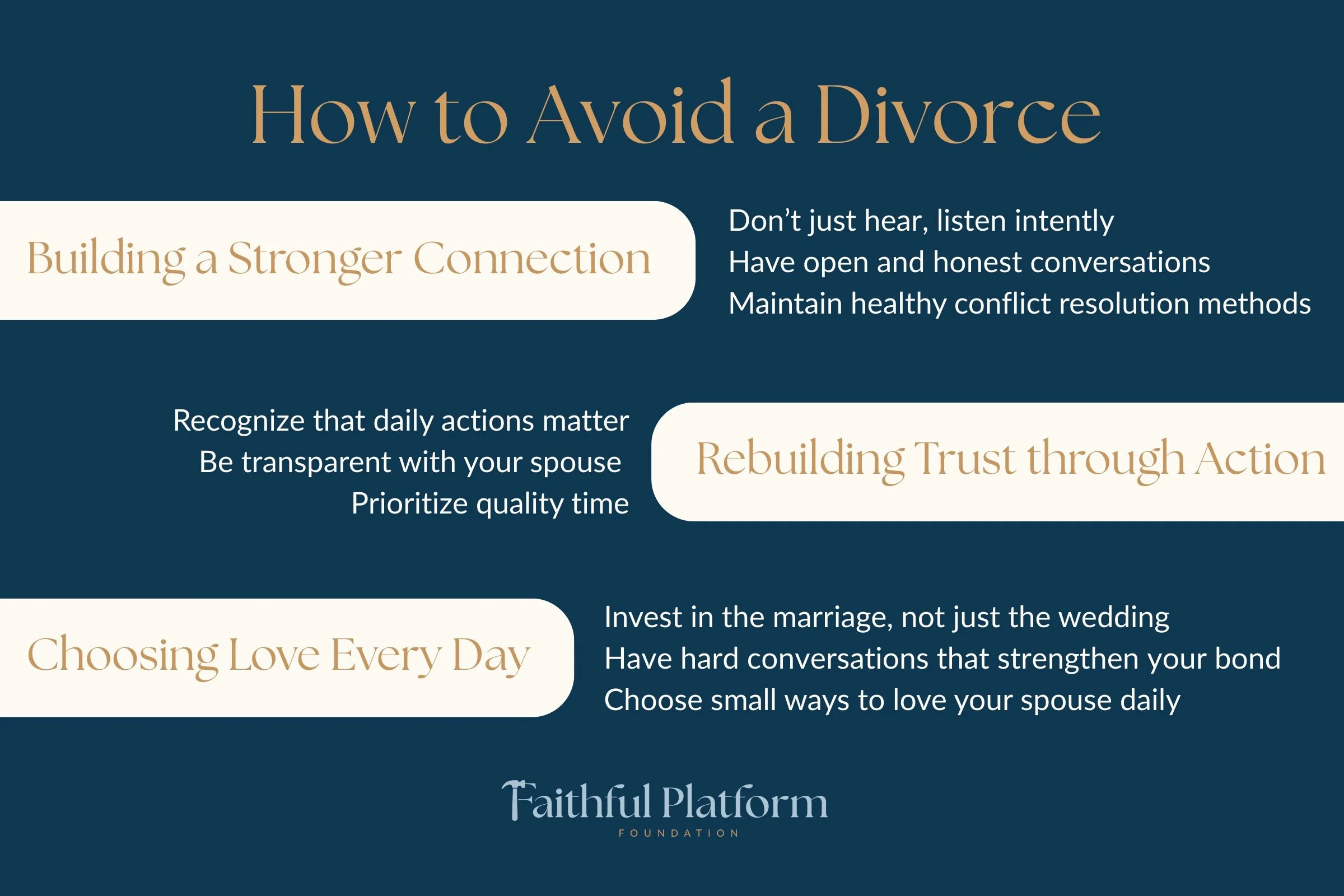How to Avoid Divorce: Communication and Trust Building
Marriage is one of life’s greatest commitments, a partnership that brings joy, purpose, and growth, but also challenges that test patience, resilience, and love. Every couple begins with high hopes, yet statistics show that roughly half of marriages in the United States end in divorce. The good news? Many of these separations are preventable.
When couples intentionally nurture communication, build trust, and choose love daily, they lay a foundation that can weather even the toughest storms. At FP Foundation, we know that intentional steps can transform relationships and prevent the heartbreak of divorce.
In this blog, we’ll explore why marriages struggle, practical strategies to strengthen connection, and proven ways to rebuild trust, so you can protect your relationship and help it thrive for years to come.
Why Marriages Struggle
Lack of Communication
Strong communication is the heartbeat of a healthy marriage. But over time, life’s demands, such as jobs, kids, bills, and endless to-do lists, can push couples into “logistical mode,” where conversations revolve around schedules and errands instead of emotional needs and expectations.
A couple may go weeks without discussing their desires, hopes, fears, or even what they appreciate about each other. Without intentional communication, spouses can begin to feel invisible.
Setting aside even just 15 minutes daily for distraction-free connection can foster a healthier marriage and encourage growth and communication. Whether it’s over coffee or during an evening walk, these moments can keep emotional intimacy alive.
Trust Erosion
Trust isn’t only broken by major betrayals, it can crumble from repeated small breaches. Hiding purchases, downplaying mistakes, or consistently showing up late sends the message: “You can’t rely on me.”
When trust is weakened, even minor disagreements can escalate quickly. Spouses begin to second-guess each other’s words and intentions. Repairing this damage takes time, but it’s possible with transparency, accountability, and patience.
The FP Foundation offers tools, including counseling, that can help your marriage when trust is broken or you feel like you are stuck in conflict and unable to resolve it together. Counseling creates a safe space to share your doubts, fears, and issues, while providing the tools needed to help mend the relationship and communicate more effectively in the future.
The Compatibility Myth
Our culture tells us that if you find your “soulmate,” everything will fall into place. But real marriage is less about finding the perfect match and more about becoming the right partner. Compatibility is built through shared values, aligned goals, and mutual effort, not just chemistry.
Even the happiest couples can disagree on money, parenting, or lifestyle choices. The key is how they handle these moments. With the right tools, these differences can become opportunities for growth instead of sources of division.
Building a Stronger Connection
Listening vs. Hearing
There’s a big difference between hearing and truly listening. Hearing is passive, you catch the words but miss the meaning. Listening is active, you focus fully, ask clarifying questions, and respond with empathy and seek to understand.
Another helpful technique is reflective listening:
Listen without interrupting.
Summarize what your spouse said (“So what I’m hearing is…”).
Validate their feelings before offering solutions.
This simple shift can turn even tense conversations into moments of connection.
Open Conversations
Vulnerability flourishes in safety. When you know your spouse won’t mock, dismiss, or punish you for speaking honestly, you’re more likely to open up. Using “I” statements instead of “you always” accusations is one way to keep conversations productive. Instead of: “You never help with the kids.” Try: “I feel overwhelmed when I handle the kids alone. Could we figure out a better balance?” This keeps the focus on problem-solving rather than blame.
Vulnerability flourishes in safety. When you know your spouse won’t mock, dismiss, or punish you for speaking honestly, you’re more likely to open up. Using “I” statements instead of “you always” accusations is one way to keep conversations productive. Instead of: “You never help with the kids.” Try: “I feel overwhelmed when I handle the kids alone. Could we figure out a better balance? ”It is also helpful to give an example of when this has happened recently, as that makes it easier for your spouse to understand what situations are tied to the expression. This keeps the focus on problem-solving rather than blame.
Healthy Conflict Resolution
Conflict itself isn’t a threat to marriage, but unresolved conflict is. Couples who avoid arguments often let resentment build, while those who fight destructively can inflict lasting wounds. The healthiest couples learn to “fight fair.”
Ground rules might include:
No yelling or name-calling.
Take time-outs if emotions run too high. Be sure to specify when you’ll be ready to time back in (for example, “This conversation is becoming too emotional for me to be reasonable. Can we take a time-out and talk about this in an hour?”)
Focus on one issue at a time. Don’t bring up past issues that have already been resolved.
Sometimes it is helpful to just pause, reset, and return to the conversation with empathy and clarity.
Rebuilding Trust and Preventing Divorce
Daily Actions Matter
Love isn’t sustained by grand gestures alone, it’s the everyday actions that matter most. Saying “thank you” for doing the dishes. Sending a text during a busy workday. Leaving a note in their car. These acts signal, “You matter to me.” Create a “Daily Five” habit where you make it a priority to show love in five small, intentional ways daily.
Transparency Creates Safety
Honesty is non-negotiable in a marriage. Share your schedule, your worries, and your mistakes, even when it’s uncomfortable. Secrecy breeds suspicion, but openness invites trust.
Couples can go from guarded to deeply connected by practicing full access transparency where you share passwords, financial accounts, and even deeply private struggles without fear of judgment.
Prioritizing Quality Time
Busyness is one of marriage’s biggest silent killers. Without regular quality time, couples can drift apart without realizing it. Whether it’s a weekly date night, cooking dinner together, or taking a long walk, the key is intentionality.
Research shows that couples who spend at least 5 hours of quality time per week report significantly higher relationship satisfaction.
Choosing Love Everyday
Invest in Marriage, Not Just the Wedding
Your wedding day is just the beginning celebration of the marriage, which is a lifelong mission. Keep studying your spouse: What are their current dreams? How have their needs changed? What stresses are they carrying?
Just like careers require ongoing training, marriages need ongoing investment. That might mean reading marriage-strengthening books together, attending a couples’ retreat, or setting shared goals each year.
Hard Conversations Strengthen Bonds
Avoiding tough topics might keep the peace temporarily, but it creates cracks in the foundation. Address finances, parenting philosophies, extended family boundaries, and personal expectations early and often.
Love is a Choice
Feelings ebb and flow, but commitment is a daily decision. Choosing your spouse even in seasons of frustration is what keeps love resilient. Forgiveness, patience, and grace turn “for better or worse” from words into reality.
The FP Foundation Connection
At the FP Foundation, we believe marriages don’t just survive by accident; they thrive through intentional action. Our mission is to equip couples with the tools they need for lasting love.
If you’re ready to strengthen your communication, rebuild trust, and deepen your connection, contact us today. Because your marriage is worth fighting for.
FAQs — Your Marriage Questions Answered
How can communication prevent divorce?
Consistent, respectful communication keeps spouses emotionally connected. It allows issues to be addressed before they become dealbreakers and ensures both people feel heard and valued.
What are the biggest communication mistakes in marriage?
Interrupting, speaking with blame, avoiding hard conversations, and assuming your spouse “should just know” how you feel.
How do you rebuild trust after it’s been broken?
By combining transparency, patience, and consistent follow-through. Trust is rebuilt over time through actions, not promises.
Can a lack of trust be fixed in a marriage?
Yes. If both spouses are willing to address root causes, commit to accountability, and seek support when needed.
What is the biggest predictor of divorce?
According to Dr. John Gottman’s research, contempt—criticism laced with disrespect—is the single strongest predictor of divorce.
How do couples resolve conflicts in a healthy way?
By managing emotions, avoiding personal attacks, and focusing on solutions rather than winning.
When should a couple seek marriage counseling?
When communication consistently breaks down, conflicts escalate, or emotional distance sets in. Early intervention is more effective than waiting until resentment is deep.
Is it possible to avoid divorce if both spouses are unhappy?
Yes—if both commit to honest self-reflection, counseling, and making tangible changes, many marriages can recover, and even flourish after a season of struggle!






